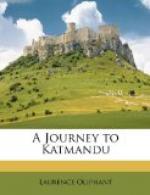At dawn on the following morning the stir and bustle in camp announced an early start, and our elephant appeared at the tent door just as the gallant rifle corps marched past, the band playing the “British Grenadiers.” Mounting the elephant, we picked our way through the debris of the camp, now almost deserted; some few of the coolies were still engaged packing the conical baskets which they carry on their backs, one strap passing over the forehead, and two others over the shoulders. The appearance of a hill coolie as he thus staggers along under his tremendous burden is singular enough, and so totally unlike that of the coolies of the plains, that it was a sort of promise of there being in store for us more curiosities, both of Nepaulese men and manners, in their native country, and we looked with no little interest upon the first specimens we had seen of the Newar race—the aborigines of Nepaul. Short and compact, the full development of their muscle bore evidence to their almost Herculean strength. Their flat noses, high cheek-bones, small eyes, and copper-coloured complexion are unequivocal signs of a Mongolian origin, whilst the calves of their legs, which I never saw equalled in size, indicate the mountainous character of their country.
Threading our way on our wary elephant through nearly 5000 of these singular-looking beings, all heavily loaded with the appurtenances of the camp, we soon overtook the cortege of the Minister and his brothers, which consisted of three or four carriages dragged along by coolies, over a road which, in many places, must have severely tried the carriage springs, as well as nearly dislocated the joints of Jung’s “beautiful little Missis,” whom I saw peeping out of one of the windows. The rest of this motley crowd, with which we were destined to march for the next three weeks, was made up of Nepaul gentlemen in various capacities, who cantered past on spirited little horses, or squatted cross-legged in the clumsy, oddly constructed “Ecce,” a sort of native gig; besides these, there were merchants and peddlers, who followed the camp as a matter of speculation. Amidst an indiscriminate horde, our elephant jogged lazily along, generally surrounded by eight or ten others, with whom we marched for company’s sake. We usually arrived at the mango tope destined to be our camping-ground about ten o’clock in the morning, and lounged away the heat of the day in tents; towards the afternoon Jung generally went out with his gun or rifle, shooting with the former at parrots at ten yards distance, and with the latter at bottles at a hundred. There was not much attraction for the sportsman throughout the whole line of march, and I only bagged a few couple of snipe, partridges, wild-duck, and quail.




